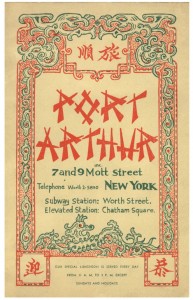Posted: May 21st, 2013 | No Comments »
Last chance to see a bunch of traditional lilong about to come down around Datian lu near Xinzha lu (Sinza Road) adjacent to the Suzhou (Soochow) Creek. Some nice examples (though severely run down over the years and subject to overcrowding) of 1920s housing, some of which have been occupied by the same families for over 70 years. Removals of residents to Jiading started this past weekend so the wreckers will be going in imminently if you want a last look….this type of structure is unique to Shanghai and not replicated anywhere else and includes the loss of several (now extremely) rare corner structures that used to define Shanghai’s streets (as you can see below)…
I’d expect the area to become a site for new high rise housing – this will probably completely obscure any decent aspect around St Teresa’s Church (Sheng Nv Xiao De Lei Sa Tang – see below) on Datian Road which was built with funds from Shanghai’s French community in 1920. Catholic, it has a Gothic exterior and interior (of course the interior has been mucked about a bit) with repeated images of St Teresa (who’s works on religious piety were translated into Chinese in the 1920s after her beatification making her a “hot” saint in China) on the floor, support pillars and internal lamp lights.
And that’s that about to all go…
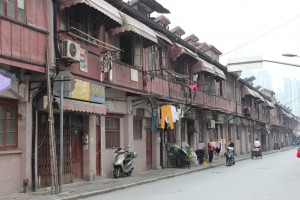
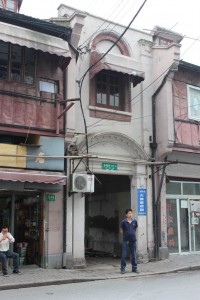
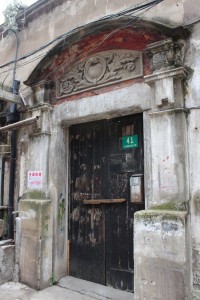
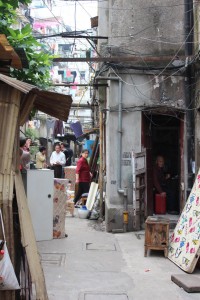
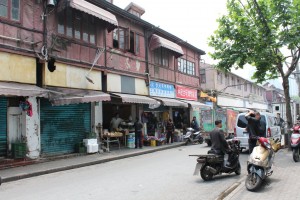
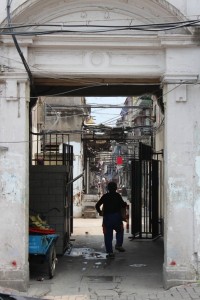
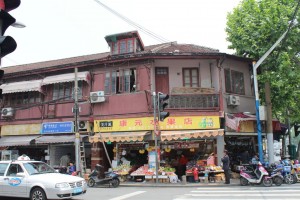
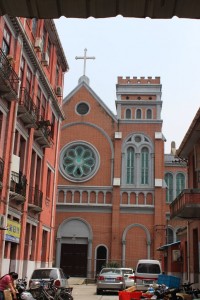
Posted: May 21st, 2013 | No Comments »
  RAS LECTURE
Â
Tuesday 21st May 2013
7 pm for 7.30pm start
RAS Library at the Sino-British College
1195 Fuxing Zhong Lu
DR DA ZHENG
Chiang Yee and Three Women

Chiang Yee (1903-1977), best known for his Silent Traveller series, was one of the most successful Chinese writers in the English language. While he was often celebrated for his literary and artistic accomplishments overseas, very few people knew the difficultiesÂ
and challenges he had experienced. The talk will focus on three women, who had each played an important role in his personal life and career. A revelation of these relationships will help us gain a better understanding of Chiang Yee as well as a deeper appreciation of the significance of women in socio-cultural development and immigrant history.
Da Zheng is professor of English and director of the Asian Studies Program at Suffolk University. A Shanghai native, he attended graduate school at Boston University in 1986, where he received his PhD in English. His recent publications include Chiang Yee: The Silent Traveller from the East (2010) and《西行画记: è’‹å½ä¼ 》(2012). He is now working on a biography of Shih-I Hsiung, who wrote the popular English language play Lady Precious Stream and the novel The Bridge of Heaven.
RSVP: to RAS Bookings at: bookings@royalasiaticsociety.org.cn
 Â
ENTRANCE: 30 rmb (RAS members) and 80 rmb (guests). Includes a glass of wine or soft drink. Priority for RAS members. Those unable to make the donation but wishing to attend may contact us for exemption.
Â
MEMBERSHIP applications and membership renewals will be available at this event.
Â
RAS MONOGRAPHS – Series 1 & 2 will be available for sale at this event. 100 rmb each (cash sale only)
Â
WEBSITE: www.royalasiaticsociety.org.cn
Posted: May 19th, 2013 | 8 Comments »
A little piece of China-American relations I didn’t know – the story of John O’Donnell. However, happened to be in Baltimore and thought (as an Edgar award winner – did I mention that before??) I’d pop along to Westminster Hall and its adjacent graveyard and see Poe’s grave and monument (see Twitter for those pics @chinarhyming). While there I came across the tomb of a certain John O’Donnell – a new China Hand to me.
So here’s O’Donnell’s story: John O’Donnell (1749-1805) was originally from Limerick but found his way to India. In 1785 he arrived in Baltimore on an East India Company ship laden with Chinese goods, the first such cargo to arrive in the Maryland city. O’Donnell, who had made a lot of money transporting China goods around in the China trade and also claimed (not sure how true it was) an aristocratic Irish lineage, decided to settle in Baltimore. He continued trading China made goods and married a local sea captain’s daughter who had lived in both India and China before. He invested most of his money in developing Baltimore and effectively became a founding father of the city – hence his interment in Westminster Hall’s graveyard.
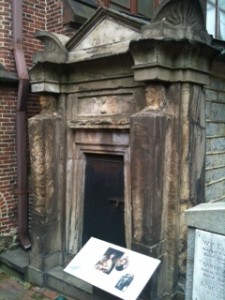
Interestingly there is a O’Donnell Square and Street in the Baltimore neighbourhood of Canton. This area developed out of the plantation owned by O’Donnell in Baltimore bought from his fortune largely earned in the China trade and then built-out by his son in the late nineteenth century. In tribute to where most of his wealth and goods had originated O’Donnell named his plantation Canton.
There is a statue to O’Donnell in Canton (the Baltimore one, not Guangzhou sadly). The accompanying plaque reads: “Captain John O’Donnell, the founder of the Canton Community was man of great vision and accomplishment. He initiated trade between Canton, China and Baltimore in 1785 operating his own merchant sailing vessels. This public square, once the site of Canton Market, is dedicated in his honor.â€

Posted: May 18th, 2013 | No Comments »
A study of the lesser known role of the British in Macao’s history from Rogeria Miguel Puga…
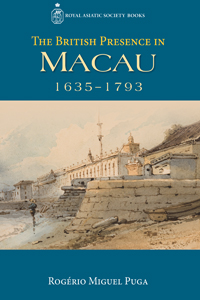
For more than four centuries, Macau was the centre of Portuguese trade and culture on the South China Coast. Until the founding of Hong Kong and the opening of other ports in the 1840s, it was also the main gateway to China for independent British merchants and their only place of permanent residence. Drawing extensively on Portuguese as well as British sources, The British Presence in Macau traces Anglo-Portuguese relations in South China from the first arrival of English trading ships in the 1630s to the establishment of factories at Canton, the beginnings of the opium trade, and the Macartney Embassy of 1793. The British and Portuguese—longstanding allies in the West—pursued more complex relations in the East, as trading interests clashed under a Chinese imperial system and as the British increasingly asserted their power as “a community in search of a colonyâ€.
Rogério Miguel Puga is a Senior Researcher at the Centre for English, Translation and Anglo-Portuguese Studies at the New University of Lisbon, where he also teaches. He is the author of A World of Euphemism: Representations of Macao in the Work of Austin Coates: City of Broken Promises as Historical Novel and Female Bildungsroman.
Posted: May 17th, 2013 | No Comments »
Some dates in weird and wonderful locations where I’ll be speaking on Midnight in Peking to tie in with the launch of the (Edgar award winning and charted Indie Book Stores of America list) Midnight in Peking paperback…
Baltimore – Saturday May 18th – 6pm – The Ivy Bookstore – 6080 Falls Road, Baltimore, Maryland – RSVP and more details here
Detroit – Monday May 20th – 11am – The Detroit Book and Author Society Luncheon – The Burton Manor Banquet and Conference Center – 27777 Schoolcraft Road, Livonia, Michigan – more details and RSVP here
Dayton – Tuesday May 21st – 7pm – Books & Co at the Greene – 1414 South Patterson Boulevard, Dayton, Ohio
Tulsa – Wednesday May 22nd – 7pm – Book Smart Tulsa – NB: this event will be at the University of Oklahoma-Tulsa, Founders Hall, 4502 East 41st Street, Tulsa, Oklahoma
Wichita – Thursday May 23rd – 7pm – Watermark Books – 4701 East Douglas – Wichita, Kansas
St Louis – Friday May 24th – 7pm – St Louis County Library – 1640 South Lindbergh Boulevard, St Louis, Missouri
Naturally, should happen to live in any of these places, it would be great to see you!!
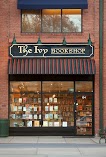
the lovely looking Ivy Bookshop in Baltimore…
Posted: May 16th, 2013 | No Comments »
A little exhibition that may appeal to any China Rhyming regulars passing through New York…
Shanghai Glamour: New Women 1910s-40s
April 26, 2013 to September 29, 2013
Museum of Chinese in America
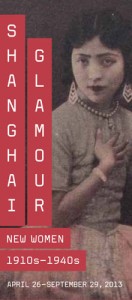
Shanghai Glamour explores how Shanghai women and their fashionable dress epitomized the seduction and mystery of this legendary city as it was modernizing in the early 20th century. Shanghai was established as a treaty port in the nineteenth century and became a major modern metropolis by the 1920s, internationally known as “the Paris of the East.â€
The city’s identity was deeply associated with its women and their fashion. Their dresses and manners textured the city’s modern life and became the emblems of Shanghai modernity. Beyond the glamour, the changing styles of female clothing and the controversial images of modern women also manifested the social and political anxieties in the transitional period that ushered in new gender roles.
The exhibition, guest-curated by scholar Mei Mei Rado, features 12 exquisite outfits from 1910s to 1940s on loan from the China National Silk Museum in Hangzhou – on view for the first time in the United States – and three dresses from prominent private New York collections. They will be presented alongside over 50 accessories, posters, lifestyle magazines, and period images. Focusing on the unique Shanghai allure represented by women of different roles and their dresses, the exhibition examines how Shanghai women initiated styles that expressed their identities in relation to the city and how each archetype of femininity came to be associated with a certain characteristic Shanghai look. The show will describe styles from various corners of Shanghai society — the student, socialite, courtesan, movie star, artist, dancing girl, and housewife — to reconstruct the social and cultural pulses behind the many facets of Shanghai glamour.
Curatorial Advisor: Dorothy Ko
Guest Curator: Mei Mei Rado
Exhibition Design: Rebecca Shea
Advisory Committee:
Valerie Steele (Fashion Institute of Technology); Harold Koda (Metropolitan Museum of Art, Costume Institute); Dorothy Ko (Barnard College); Christina Moon (Parsons The New School for Design); Jason Sun (Metropolitan Museum of Art)
Image credit:Â Cover of Ling Long magazine, no. 1, 1931. Courtesy of Columbia University Libraries
Posted: May 15th, 2013 | No Comments »
After yesterday’s post on the Port Arthur Restaurant and Curio Store that once stood resplendently on Mott Street in New York’s Chinatown and the history of Chinese restaurants in the city I happened, by chance, to find myself, strolling (I can’t quite bring myself to say “flaneuring”, but I suppose I was) at the end of Mott Street. The Port Arthur stood at No.7-9. Sadly it appears to be one of the few buildings that has been rebuilt as far as I can tell by comparing the picture of the old Port Arthur (here) and the building that is now nos. 7-9 Mott Street and is the home of the New York Chinatown Community Center. Below though is a photograph of the adjacent buildings that appear to date from the time of the Port Arthur to give some flavour…
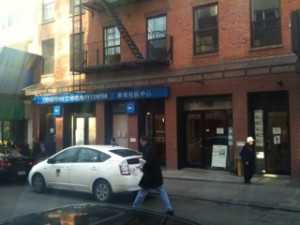
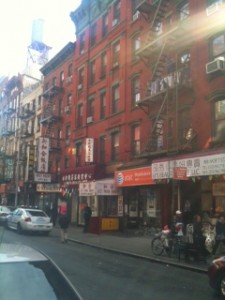
Posted: May 15th, 2013 | No Comments »
Thanks to The China Story for posting this article from The China Journal of Science and Arts in 1925 on the state and development of Chinese restaurants in America in 1925. If you want to see a pictire of the Port Arthur restaurant on New York’s Mott Street that’s mentioned – I posted one here a while back. I also posted a review of London’s Chinese restaurant scene from slightly later, in 1932, a while back that might make for an interesting contrast.
